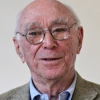Jerome Bruner

Jerome Bruner
Jerome Seymour Brunerwas an American psychologist who made significant contributions to human cognitive psychology and cognitive learning theory in educational psychology. Bruner was a senior research fellow at the New York University School of Law. He received a B.A. in 1937 from Duke University and a Ph.D. from Harvard University in 1941. A Review of General Psychology survey, published in 2002, ranked Bruner as the 28th most cited psychologist of the 20th century...
NationalityAmerican
ProfessionScientist
Date of Birth1 October 1915
CountryUnited States of America
Understanding something in one way does not preclude understanding it in other ways.
Grasping the structure of a subject is understanding it in a way that permits many other things to be related to it meaningfully. To learn structure in short, is to learn how things are related.
One seeks to equip the child with deeper, more gripping, and subtler ways of knowing the world and himself.
I would urge that the yeast of education is the idea of excellence, and the idea of excellence comprises as many forms as there are individuals, each of whom develops his own image of excellence. The school must have as one of its principal functions the nurturing of images of excellence.
Surely knowledge of the natural world, knowledge of the human condition, knowledge of the nature and dynamics of society, knowledge of the past so that one may use it in experiencing the present and aspiring to the future--all of these, it would seem reasonable to suppose, are essential to an educated man. To these must be added another--knowledge of the products of our artistic heritage that mark the history of our esthetic wonder and delight.
We cannot, even given our most imaginative efforts, construct a concept of Self that does not impute some causal influence of prior mental states on later ones.
Telling others about oneself is...no simple matter. It depends on what we think they think we ought to be like
We are only now on the threshold of knowing the range of the educability of man-the perfectibility of man. We have never addressed ourselves to this problem before.
Stimuli, however, do not act upon an indifferent organism.
Rather, the master question from which the mission of education research is derived: What should be taught to whom, and with what pedagogical object in mind? That master question is threefold: what, to whom, and how? Education research, under such a dispensation, becomes an adjunct of educational planning and design. It becomes design research in the sense that it explores possible ways in which educational objectives can be formulated and carried out in the light of cultural objectives and values in the broad.
We need to conceive of ourselves as "agents" impelled by self-generated intentions.
There is a deep question whether the possible meanings that emerge from an effort to explain the experience of art may not mask the real meanings of a work of art.
The notion of multiple literacies recognized that there are many ways of being-and of becoming-literate, and that how literacy develops and how it is used depend on the particular social and cultural setting.
In the perception of the incongruous stimuli, the recognition process is temporarily thwarted and exhibits characteristics which are generally not observable in the recognition of more conventional stimuli.